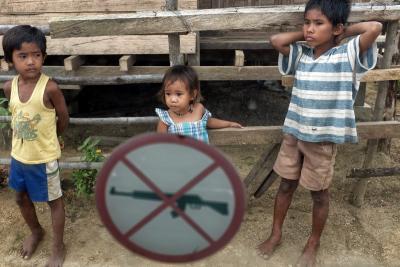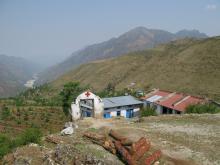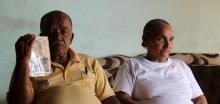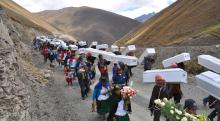Basic international humanitarian law (IHL) rules applicable to this situation:
Children affected by armed conflict are entitled to special respect and protection.
Children must not be recruited into armed forces or armed groups.
Children must not be allowed to take part in hostilities.
The case in brief
Since 2001 the Secretary-General of the United Nations (UN) has included a list of parties to conflict who unlawfully recruit and use children in his annual report on children and armed conflict. The Moro Islamic Liberation Front (MILF), a non-state armed group engaged in conflict with government forces in the Philippines, had been listed since 2003.
The Philippines is a party to the Optional Protocol to the Convention on the Rights of the Child on the involvement of children in armed conflict, which includes obligations regarding demobilization and reintegration of children who have been unlawfully recruited.
The MILF recognized that conforming to international law regarding the recruitment and use of children would enhance its legitimacy and local reputation. It therefore ceased recruiting children and released all children recruited back into society. Subsequently the Government of the Philippines adopted a law protecting children affected by armed conflict in 2018.
IHL compliance highlights
- In 2009 the MILF signed an Action Plan with the UN to prevent the recruitment of children, and to release children from its ranks and support their reintegration into their communities.
- Over eight years the MILF worked systematically to build awareness and understanding of the issues around the recruitment and use of children in armed conflict among its forces and affected communities, thereby building support for the Action Plan.
- In 2017, when all children in its ranks had been released, the MILF was removed from the UN’s list of parties to conflict who recruit and use children. In a statement, the MILF Chairman acknowledged the group’s commitment to comply with IHL in this regard: “The Moro Islamic Liberation Front (MILF) is committed to ensuring that no children are associated with its armed forces. The final dissociation of 1,869 of our children demonstrated our commitment to that international norm."
- In 2019, the Government of the Philippines adopted a law affording special protection to children affected by armed conflict.
Case prepared by Candace Holmes, Katherine Dolansky, and Richard Young, LL.M and J.D. students at Emory University School of Law, under the supervision of Professor Laurie Blank, Emory University School of Law and Didina Coelho, Niko Hadjivasiliou, Michelle Moore, Matt Peters and Jacob Smith, LL.M. students at University College London, under the supervision of Professor Kimberley Trapp and Priya Urs, PhD candidate at University College London.
A. PHILIPPINE’S MORO ISLAMIC LIBERATION FRONT (MILF) SIGNS ACTION PLAN TO PREVENT RECRUITMENT AND REINTEGRATE CHILDREN INTO CIVILIAN LIFE
[Source: Office of the Special Representative of the Secretary-General for Children and Armed Conflict, MILF signs an action plan to prevent recruitment and reintegrate children into civilian life, United Nations, 31 July 2009, available at https://childrenandarmedconflict.un.org/31jul09/]
NEW YORK, 31 July 2009 – Radhika Coomaraswamy, Special Representative of the Secretary-General for Children and Armed Conflict, welcomes the signature of an action plan by The Moro Islamic Liberation Front (MILF). The action plan sets concrete and time-bound steps to prevent the recruitment and use of children and to separate any children who may be found among its forces. It also ensures unimpeded access to monitoring teams and provides for children to be reintegrated into civilian life.
The action plan occurs within the framework of the monitoring and reporting mechanism established by Security Council Resolution 1612. The MILF initially committed to comply with the recommendations of the Security Council during the visit of the Special Representative to the Philippines in December 2008. The action plan was developed in collaboration with UNICEF and the UN country team.
[…]
B. SUPPLEMENTAL GENERAL ORDER IN SUPPORT OF THE ACTION PLAN BETWEEN THE MORO ISLAMIC LIBERATION FRONT (MILF) AND THE UNITED NATIONS
[Source: ‘Supplemental General Order for General Order Nos. 1 & 2; and in Support of the Action Plan Between the Moro Islamic Liberation Front (MILF) and the United Nations in the Philippines Regarding the Issue of Recruitment and Use of Child Soldiers in the Armed Conflict in Mindanao’, 20 January 2010, available at http://theirwords.org/media/transfer/doc/1_ph_milf_biaf_2009_14-ccc4b2a59bb14cc91824e4ffb35f6591.pdf (footnotes omitted)]
Preamble
[…]
In support of the implementation of the time-bound Action Plan between the Moro Islamic Liberation Front (MILF) and the United Nations in the Philippines regarding the Issue of Recruitment and Use of Child Soldiers in the Armed Conflict in Mindanao;
The MILF-Bangsamoro Islamic Armed Forces (BIAF) hereby reaffirms its strict policies to ensure the compliance of all commanders and officers of the MILF-BIAF, that no child shall be admitted into the BIAF;
[…]
Policy on Non-Recruitment of Children
[…]
3. No child shall be admitted into the BIAF.
The BIAF shall not, under any circumstances, recruit or use in hostilities persons under the age of 18 years.
The BIAF shall ensure that persons under the age of 18 years who were recruited or used in hostilities are officially released from service. The BIAF shall, when necessary, accord to these persons all appropriate assistance for their physical and psychological recovery and their social reintegration.
[…]
Sanctions for Non-Compliance
This supplemental general order also further strengthens General Order Nos. 1 and 2, particularly Article 36 (As amended by G.O. No. 2), to provide the necessary sanctions for non-compliance.
C. MILF HONORS 2009 ACTION PLAN TO RELEASE CHILD SOLDIERS
[Source: UNICEF, Press Release, MILF ends association of children within their ranks, 18 February 2017, available at https://www.unicef.org/philippines/press-releases/milf-ends-association-children-within-their-ranks]
Sultan Kudarat, PHILIPPINES, 18 February 2017 – The UN-MILF Action Plan, signed in 2009 and extended in 2013 signifies the commitment of the MILF to end the recruitment and use of children within their ranks. The progress achieved to date is the result of the commitment and action by the MILF at the highest levels, as well as by front and base commanders. The systematic sensitization, awareness raising and training initiatives for the BIAF and communities living in core MILF base command areas were essential pre-requisites to achieve a level of understanding and acceptance on the issue of recruitment and use of children.
[Source: Hundreds of MILF child soldiers released in Philippines, Al Jazeera News, 11 March 2017, available at https://www.aljazeera.com/news/2017/03/hundreds-milf-child-soldiers-released-philippines-170311064133681.html]
Hundreds of child soldiers have been released by the Philippines' main separatist rebel group, continuing its commitment to end the recruitment and use of children within its ranks.
[…]
Reporting from the disengagement ceremony in Lanao del Sur, Al Jazeera's Jamela Alindogan said Friday's release did not happen overnight.
"This is something that started eight years ago," she said. "It required a lot of ground work, a lot of investigations, a lot of re-education, not just of leaders of the Moro Islamic Liberation Front, but also of parents who have had their children exposed to combat."
[…]
The first in a series of disengagement ceremonies took place in February and the group will eventually disengage more than 1,800 children, according to UNICEF.
Some of the children fought on the front line with the group, but the majority performed tasks as couriers and support staff.
Richard Heydarian, a professor of political science in Manila, told Al Jazeera it is important to remember that many of these child soldiers were born into the conflict.
"We have to keep in mind that this is not like South Sudan or Sierra Leone ... where you have these children ripped apart from their family and forcibly coerced to become child soldiers," he said.
"Many of these children are actually very much part of the fabric of the community that has been supporting the Moro Islamic Liberation Front."
[…] Al Jazeera's Alindogan said Friday's ceremony shows the sincerity of the MILF in making sure the "third and fourth generation of children are not going to end up with the same fate as their parents and grandparents".
The children who are released will be offered scholarships to finish school, as well as support from the government and NGOs for full integration back into society.
[…]
Heydarian told Al Jazeera that the disengagement of the child soldiers is a "symbolic" move by the MILF, but the government remains too involved in other crises.
"It shows the MILF wants to be part of mainstream Philippines", Heydarian said.
D. MILF DE-LISTED FROM THE UN SECRETARY-GENERAL’S REPORT ON CHILDREN AND ARMED FORCES
[Source: Office of the Special Representative of the Secretary-General for Children and Armed Conflict, UN Officials congratulate MILF for completion of disengagement of children from its ranks, United Nations, 18 December 2017, available at https://childrenandarmedconflict.un.org/philippines-un-officials-congratulate-milf-completion-disengagement-children-ranks/]
The Moro Islamic Liberation Front (MILF) and UNICEF Philippines held a formal ceremony today in recognition to the removal of the MILF from a UN list of armed groups recruiting and using children. The Special Representative of the Secretary-General for Children and Armed Conflict, Ms. Virginia Gamba and UN Resident Coordinator in the Philippines Mr. Ola Almgren congratulated the MILF for promoting and protecting the rights of children.
“Today, we mark an important milestone for the boys and girls of the Philippines. The Joint Action Plan between the Moro Islamic Liberation Front and the United Nations on the issue of recruitment and use of children has now been fully implemented. As a result I am very happy to announce that the MILF has been delisted from the annexes of the Secretary General Annual Report on Children and Armed Conflict…This achievement is the result of a sustained commitment by the MILF with United Nations support”, the Special Representative of the Secretary-General for Children and Armed Conflict, Ms. Virginia Gamba said in her congratulatory message.
[…]
E. CHILDREN IN ARMED CONFLICT: PHILIPPINES – PROCESSES AND LESSONS LEARNED
[Source: UNICEF, Report on Children in Armed Conflict: Philippines – Processes and Lessons Learned from 2009-2017, available at https://www.unicef.org/philippines/media/881/file/Children%20in%20Armed%20Conflict:%20Philippines.pdf ]
Statement by the Chairman of the Moro Islamic Liberation Front
“The Moro Islamic Liberation Front (MILF) is committed to ensuring that no children are associated with its armed forces. The final dissociation of 1,869 of our children demonstrated our commitment to that international norm. Our children are our future and we must invest in their education and upbringing and protect them from the effects of conflict.
I would like to thank the UN-MILF Action Plan members, the field commanders and their elements, parents and everyone in the community for all their efforts to identify, register and support the dissociation of those children and for contributing to the MILF recognition and de-listing as a party associating children with its armed forces. I would like to thank the local and international organizations for their support. I would especially like to thank UNICEF.
If this document can contribute to protecting children in the world then I am thankful. I pray that peace, progress, and justice will reign in our homeland. “
[...]
F. PHILIPPINES ENACTS LAW TO PROTECT CHILDREN IN SITUATIONS OF ARMED CONFLICT
[Source: Children in Situations of Armed Conflict (CSAC) Law, Republic Act 11188, 23 July 2018, available at https://www.officialgazette.gov.ph/downloads/2019/01jan/20190110-RA-11188-RRD.pdf]
Section 1. Short Title. – This Act shall be known as the “Special Protection of Children in Situations of Armed Conflict Act”.
Sec. 2. Declaration of State Policy. – It shall be the policy of the State to provide special protection to children in situations of armed conflict from all forms of abuse, violence, neglect, cruelty, discrimination and other conditions prejudicial to their development, taking into consideration their gender, cultural, ethnic and religious background. […]
Sec. 3. Scope of Application. – This Act shall apply to all children involved in, affected by or displaced by armed conflict. […]
Sec. 5. Definition of Terms. – As used in this Act: […]
(g) Child refers to:
(1) A person below eighteen (18) years of age; or
(2) A person eighteen (18) years of age or older but who is unable to fully take care of one’s self; or protect one’s self from abuse, neglect, cruelty, exploitation or discrimination; and unable to act with discernment because of physical or mental disability or condition; […]
Section 23. Release of Children Involved in Armed Conflict (CIAC). – The State shall take all feasible measures to ensure that children recruited or used in armed conflict are demobilized, dissociated or otherwise released from the government force or armed group. […]
The State, through its concerned agencies, in coordination with other stakeholders shall have the following duties:
[…] (e) Provide free legal assistance to released CIAC ensuring that the legal needs of the former CIAC will be addressed, such as the prohibition or stoppage of filing charges or dismissal of cases against CIAC as criminal or political offenders irrespective of their association with any-armed group or government force; […]
Section 28. Dismissal of Criminal Cases. - Upon the effectivity of this Act, criminal cases against children involved in armed conflict shall immediately be dismissed and the child shall be referred to the LSWDO. Such office, upon thorough assessment of the child, shall determine whether to release the child to the custody of the parents, or refer the child to prevention, rehabilitation and reintegration programs as provided under this Act. […]
Section 29. Inventory of Custody of Children in Situations of Armed Conflict. - The AFP, PNP, BJMP, DSWD, NCIP, NCMF and the concerned LGUs are hereby directed to submit to the CWC, within ninety (90) days from the effectivity of this Act, an inventory of all children in situations of armed conflict under their custody.
Section 30. Children Who Reach the Age of Eighteen (18) Years Pending Court Proceedings or in Suspended Sentences. - In cases when a child with a pending case reaches the age of eighteen (18) years, the Family Court shall dismiss the case against the person and determine, in consultation with concerned agencies, whether or not there is a need for the person to undergo appropriate rehabilitation and reintegration programs provided under this Act. […]
Section 31. Children Who Have Been Convicted and are Serving Sentence. - Persons who have been convicted and are serving sentence at the time of the effectivity of this Act and who were below the age of eighteen (18) years at the time of the commission of the offense for which they were convicted, and are serving sentence, shall likewise benefit from the retroactive application of this Act. They shall be entitled to appropriate dispositions provided under this Act, and their sentences shall be adjusted accordingly. They shall be immediately released if they are so qualified under this Act or other applicable laws.
Discussion
I. Classification of the Situation and Applicable Law
1. How would you classify the situation between the MILF and the government of the Philippines? Does it amount to an armed conflict? What further information would you need to make such a determination? Which rules of IHL apply? (GC I-IV, Art. 3; P II, Art. 1)
2. When does a non-international armed conflict end? Can a non-international armed conflict be considered to have ended prior to the signing of a peace agreement? (GC I-IV, Art. 3)
II. Protection of Children in Armed Conflicts and Obligations of Local Government and Armed Groups
3. What special protections are afforded to children in a non-international armed conflict? Does this protection differ from the protection afforded to children involved in an international armed conflict? (P I, Art. 77; P II, Art. 4(3) and 6(4); CIHL, Rules 135-137)
4. Do children have a right to education in times of non-international armed conflicts under IHL? (P II, Art 4(3)(a); CIHL, Rule 135)
5. At what age may a person be recruited into the armed forces of a State or non-state armed group? (P I, Art. 77(2); P II, Art. 4(3)(c); CIHL, Rules 136-137; 1989 Convention on the Rights of the Child, Art. 38(3); Optional Protocol on the Convention on the Rights of the Child, on the Involvement of Children in Armed Conflict, Arts 1-4)
III. Elements Contributing to Respect for IHL
6. (Documents A and E) What are the potential benefits of having an organization like UNICEF to assist in the release and reintegration of child soldiers?
7. (Document C) In your opinion, could the “systematic sensitization, awareness raising and training initiatives” contributed to the respect of the Action Plan?
8. (Document C) Do you think the fact that these child soldiers were “fabric of the community [which] has been supporting the MILF” could have influenced the latter to comply with their legal obligations?
9. (Documents C and D) Why do you think the MILF released the children through formal ceremonies? What message could such ceremonies send to the local population? To the international community? To the released children?
10. (Documents C and E) Why would a non-state armed group sign an Action Plan? Does it contribute to the legitimacy of the group in your opinion? Could the desire of MILF to “be part of mainstream Philippines” have played a role in its release of child soldiers? What about the prospect of peace?
11. (Documents D and E) What role did the de-listing of the UN list of armed groups recruiting and using children play in influencing the MILF to comply with IHL?
12. (Document F) Do you think the actions taken previously by MILF have positively influenced the Government of Philippines to enact the CSAC Law?






